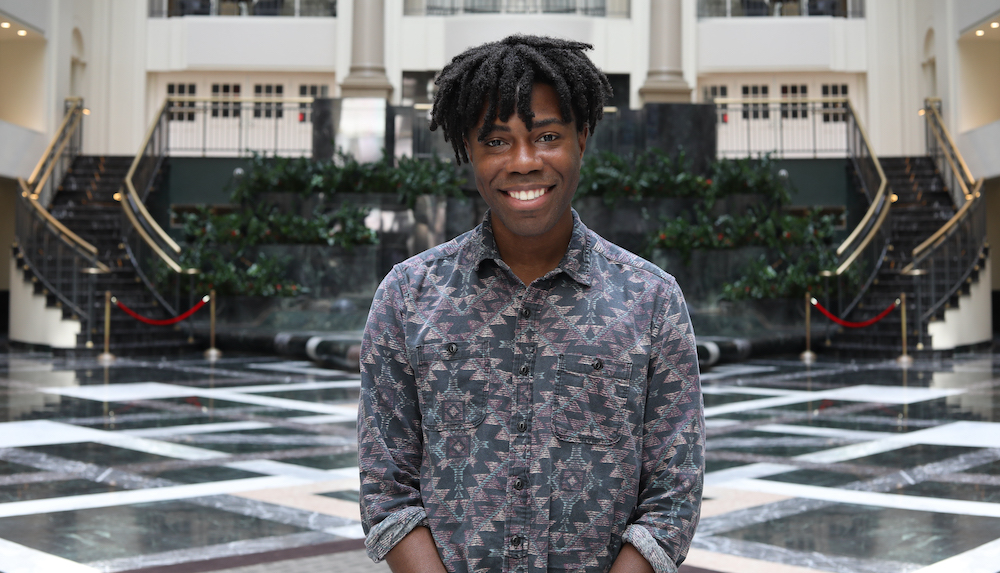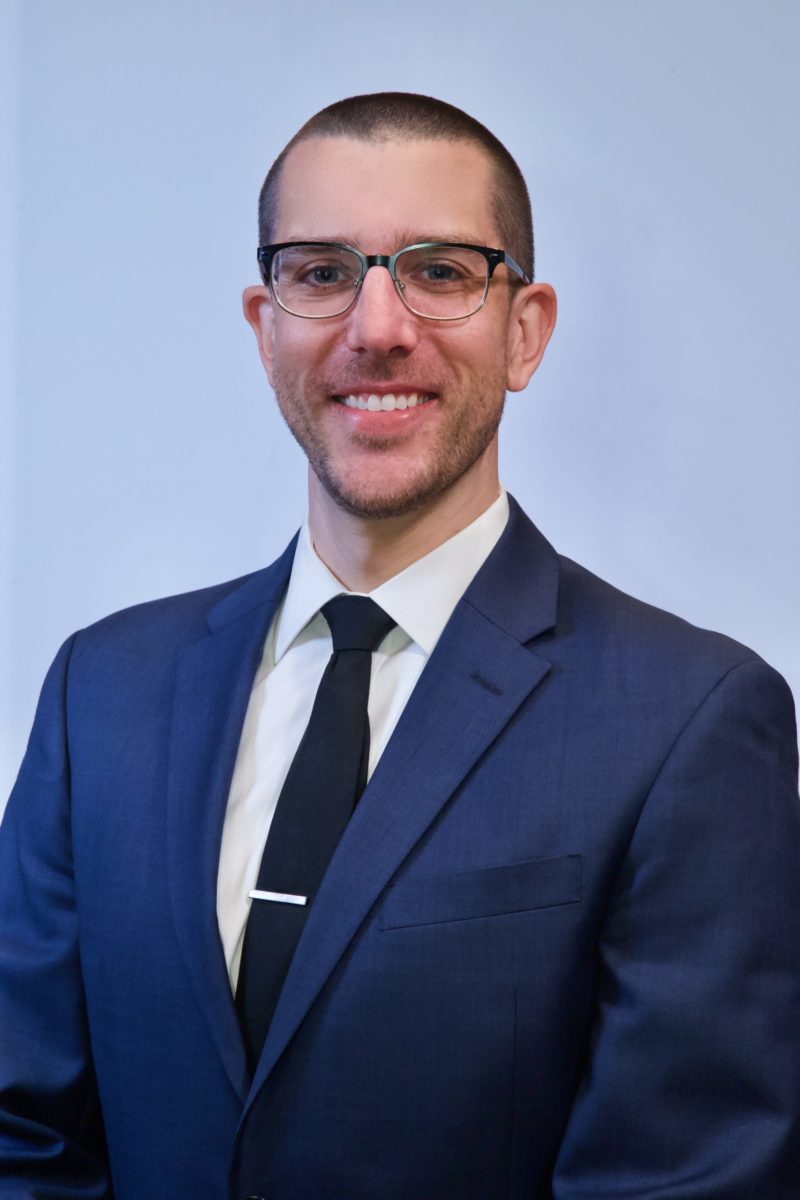When it comes to applying data science in city government, Justin Elszasz is at the top as Baltimore City’s chief data officer.
As a career path, data science didn’t even have a degree associated with it back in 2003 when he was an undergrad at Case Western Reserve University in Cleveland, Ohio. Yet here he is, someone with no master’s in data science or degree in political science, now a dedicated civil servant in a field doing the work he loves.
“The running theme of my career has been experimentation,” said Elszasz.
Growing up, the dream for Elszasz was very different than the theory-based science that goes with the work finding meaning out of data he does now. It was all about mechanical engineering. He was raised around engineers and tinkerers. His father and grandfather were car mechanics, and he had an uncle in aerospace engineering.
“From the time I was a little kid I wanted to do engineering,” said Elszasz. “Science and engineering always made sense to me. But once I got into actual product design it didn’t really satisfy me on a social level.”
When he graduated college with a degree in mechanical engineering in 2008, he started working at Biomet, a biomedical device company designing tools such as the screws and rods that go in someone’s back for corrective spine surgery for ailments like scoliosis. It was a social good for sure, but not at the scale he was satisfied with.
So he went back to school for his master’s at Columbia University. The degree was once again in engineering, but the advance degree brought a specialization in energy systems. After that was complete, it was on the road towards a Ph.D. while serving as a National Science Foundation fellow at The Sustainable Engineering Lab at the School of Engineering and The Earth Institute at Columbia University where Elszasz first came into contact with data science. He recalls studying residential energy usage at a Columbia professor’s brownstone in Harlem.
“When I was in grad school, I didn’t know for certain the energy sector was the thing for me,” he said. “I tested it out and it was a gradual shift from old school mechanical engineering of products to energy and into data science.”
In that gradual shift, he realized a Ph.D. wasn’t for him, either. He ended up moving to Baltimore in 2013, following his then-girlfriend, who is now his wife.
Living in Baltimore, Elszasz started working for Navigant, an energy policy consulting firm in D.C. With the commute between the two cities, he started a new project that became another experiment: A data science blog called The Training Set. It gave him a chance to dig in and tinker with the city’s open data while he rode the train from Baltimore to D.C for work.
Eventually, the discipline became his career, as well. Over the course of four years, Elszasz transitioned laterally at his job from a role as consultant on energy conservation policy to a role he found more interesting in data science. The interest and initiative led to a role managing data science teams that were evaluating federal energy efficiency programs for Navigant.
These data problems had real impact. He recalled one project with the U.S. Department of Energy that evaluated how much the U.S. could save on carbon emissions over the next 30 years if it were to change the efficiency of furnaces. It was this work that put him on a path to becoming a civil servant.
“It was a gradual process of learning and putting together these different puzzle pieces,” said Elszasz. “It was really the experience of working with the Department of Energy that molded together all of those things.”

Justin Elszasz presents data from The Training Set at Baltimore Data Day 2015. (File photo)
In 2017, he was on track for a promotion at Navigant. But Elszasz heard something interesting back in the town where he lived: Baltimore had been awarded a grant through Bloomberg Philanthropies to create a new innovation team in city government under Mayor Catherine Pugh. They were looking for a data scientist. He saw an opportunity to have his cake and eat it, too — a way to make a social impact and continue to be an individual contributor on data projects.
Looking back on the hiring process, Elszasz doesn’t think he was the most skilled candidate for the job at the time, but he believes he had the most passion for data science and serving the city he lived in.
“More often than not it’s not the technical skill that gets you the job,” he said. “It’s, can you talk about what their problems are, understand them and start to think about what your skills bring to the table.”
For Elszasz, it was his ability to show and prove he could become an expert in a topic he didn’t know. He’s moved up the ladder in city government, first as a data scienitst, then as deputy director of CitiStat under the Mayor’s Office of Performance and Innovation. Then, in March, he was appointed by Mayor Brandon Scott as the city’s chief data officer, where he’s charged with working across city government to improve data practices, as well as usher in new tools and governance frameworks.
Through successive promotions, he has realized that it’s often a candidate’s experience, passion for the career and critical thinking skills that make the difference.
“I think a lot of technical firms are coming around to the idea that the degree isn’t the end-all, be-all,” said Elszasz. “It’s more about what you can show you can do. Do you have a portfolio? Have you shown some other interest in this kind of work, even if your degree was in 19th century literature?”
“More often than not it’s not the technical skill that gets you the job. It’s, can you talk about what their problems are, understand them and start to think about what your skills bring to the table.
For the City Data Fellows program he created while serving at Citistat, the first hire had a Ph.D. in linguistics. Data skills were picked up on the job. It wasn’t the technical skills that matter most, but the ability to scope a problem and solve it. That requires pointing to real world issues and finding the relevant datasets that can contextualize and inform the problem, if not offer potential solutions.
“If you came into data science because you love machine learning, training models, doing really sophisticated cutting edge work, city government isn’t for you,” said Elszasz. “What we’re looking for in city government is, do you have your finger on the pulse of what’s going on in Baltimore, and how data might be able to solve some of those problems.”
For Elszasz, it was the wealth of experience in a variety of different fields that allowed him to synthesize the data and offer solutions. He tends toward learning as he goes so he can often still break it down in layman’s terms, since he’s not far from the layman himself. Every path he’s dabbled in has led him to the current role. Even now, he wouldn’t go back and try to start off as a data scientist so he could be more experienced in the field he’s currently in. It was the path that got him here that he values most.
“When I was in grad school, I didn’t know for certain the energy sector was the thing for me,” said Elszasz. “I tested it out and it was a gradual shift from old school mechanical engineering of products to energy and into data science. If you’re in your 20s, don’t have a family yet, take the opportunity to experiment. You’re not going to be lesser off for having spent two years at a job you wind up not liking. You’re not worse off. You’re better off because you’ve learned something about yourself.”
Donte Kirby is a 2020-2022 corps member for Report for America, an initiative of The Groundtruth Project that pairs young journalists with local newsrooms. This position is supported by the Robert W. Deutsch Foundation.
This is How I Got Here, a series where we chart the career journeys of technologists. Want to tell your story? Get in touch.
Join our growing Slack community
Join 5,000 tech professionals and entrepreneurs in our community Slack today!
Donate to the Journalism Fund
Your support powers our independent journalism. Unlike most business-media outlets, we don’t have a paywall. Instead, we count on your personal and organizational contributions.

Maryland firms score $5M to manufacture everything from soup to nanofiber

National AI safety group and CHIPS for America at risk with latest Trump administration firings

How women can succeed in male-dominated trades like robotics, according to one worker who’s done it


